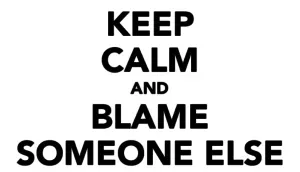Articles by Michael Merrill

Are You Sabotaging Your Career

ARE YOU SABOTAGING YOUR CAREER?
We do it all the time. Go back to the Great Recession.
“It was the bank’s fault!”
“The government’s fault.”
“My fau — no, wait . . . I was tricked!”
We live in a blame culture. So, it got me thinking. When do we develop this ‘”survival skill”?
Possible Origins
FLASHBACK: CHILDHOOD
Your sibling shoves you.
You scream, “MOM!”
Your sibling locks eyes with you, smirks, then collapses to the floor in tears, just in time for Mom to see.
He covers his eyes, claiming, “He punched me.”
Moments later, he’s enjoying your savory dessert while you suffer a lonely timeout. What the . . . ?
Somewhere along the way, this evolves into the case of the missing homework.
“The dog ate it.”
“A fire burned my house down.”
“The printer broke.”
“Aliens took it.”
“I was overcome by illness.”
They’re not even that great. These all scream, “I’M A VICTIM!” because something else is to blame.
It gets better.
Believe it or not, there are sources dedicated to helping us make excuses — as if we needed help. Please don’t tell me you clicked the link to improve your blaming skills. If you did, I can’t blame you. I only blame myself.
People avoid taking ownership if it puts them in a position of being at fault. Heck, we even generated a healthy career for those whose job is to deflect responsibility. They are called lawyers!
So, what’s the deal?
We worry that if we are at fault, we will be punished or will let someone down. We’ll be blamed. Nobody wants to fail, so we do the next best thing: Blame something else. It provides us with a sensation of having solved a problem and lets us off the hook at the same time. It’s like an emotional shortcut. We become blame-throwers.
Arm Your BLAME-THROWER (I love this term)

Blame-thrower
A fictional weapon featured in the movie Mystery Men. When activated, it causes those in the vicinity to turn on one another. Here it is in action. I will neither admit nor deny my viewing of this movie.
An attempt to shift blame for your failures.

Maybe the excuse has some truth to it. However, blaming doesn’t drive you any closer to the outcome you desire. It drives you farther away. Therein lies the problem. What feels like victory impedes your progress. After all, if something isn’t your fault, why would you do anything differently? Which means you’re likely to keep repeating that mistake.
The problem with being the victim is that you lose for winning. Let me explain what I mean: If you successfully pin responsibility on someone or something else, you win. Except your brain does something interesting. It gives ownership to someone else over your outcome. It’s a poor strategy because it prevents you from learning. You are not the driver. You are a passenger.
When you blame others, you give up the power to change. It prevents learning.
Let’s put on our owner’s cap and run these scenarios again with an alternative to blame throwing.

Which of these will get you closer to the preferred outcome? Owning it! If you don’t own it, you are giving responsibility to somebody else. This means you are less likely to change your approach. Why would you? After all . . . it wasn’t your fault! Thus, to protect yourself from “failure,” you sabotage your own career success.
Here’s the other thing about blame: People see it. You think that you’ve created a rock-solid alibi and that your pinning the issue on someone else is bulletproof. Nope, people will see you as the person who always has an excuse and someone or something to blame.Refreshing is the individual who is accountable, who asks what action they can take to improve the situation vs. blaming others. So you failed at something? Own it. Put a correction in place and move on.
If not, you look a bit like these guys. Not sure about you, but I see this all the time.

Take Control of Your Career
This is how too many people approach their career. They make it about how they were wronged vs. how they can right something. Blaming helps you avoid temporary pain but fuels anger and lack of ownership. Accountability empowers ownership and fuels the next action to drive you to your end goal.
Another amazing thing about accepting responsibility (the blame): Your team sees it, and you begin to rewire the culture. They will recognize that they will not be judged on what they do wrong but rather on how they address it. Your organization will begin to put long-term solutions in place and play less of the blame game. Without constant fear of punishment, they have more flexibility in shaping their own work and contribute more to others. They will fix things on the product line and speak up because they are not worried about repercussions and punishment.
Think about it. Which of these team members do you want on your team?
Diane — “Look, I screwed up. Here is how I’m going to fix it. While I’m at it, I’m going to educate the rest of the team too, as this is a mistake others could make.”
Joe — “It wasn’t me. He did it.” (The blame-thrower)
Determine whom you want on your team and be that person yourself. When there are mistakes on your team, ask yourself what you can do to help prevent those. We all have a role we can play.
Don’t be a blame-thrower, unless you want to give away your power to change. Blame prevents learning. You need to be the victor — not the victim.
Do this:
Accept the blame and put a solution in place.
Don’t hire people who can’t own up to their mistakes.
According to Geoff Colvin, in his book Talent is Overrated: What Really Separates World-Class Performers From Everybody Else, “Average performers believe their errors were caused by factors outside their control: My opponent got lucky; the task was too hard; I just don’t have the natural ability for this. Top performers, by contrast, believe they are responsible for their errors.”
Anyone can be average. What do you expect from yourself?
Interested in learning about the other invisible forces that are holding your career back? FREE ebook: https://www.thevelocitylabs.com/ebook
Can you think of other ways we sabotage our careers? Let me know in the comments below.
